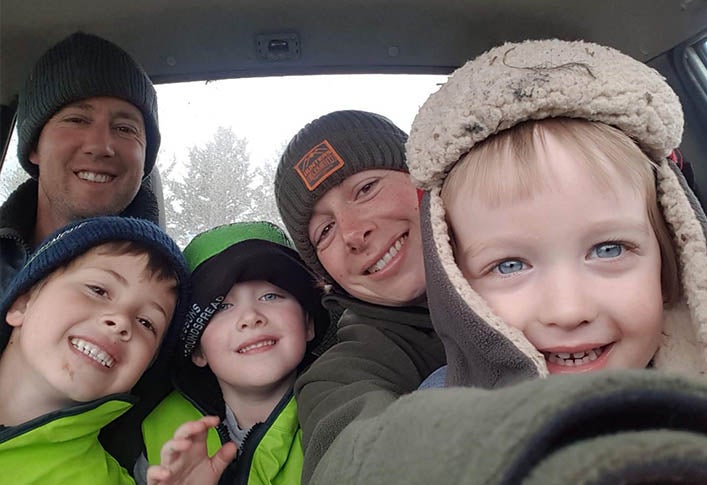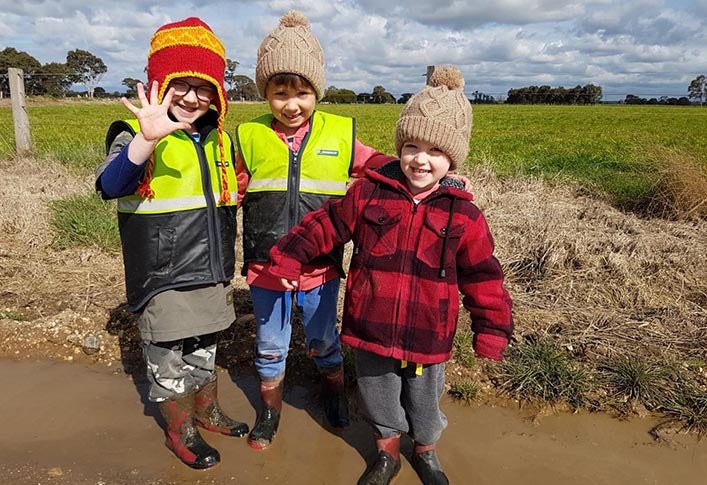Posted by on
08/04/2021
Armed with an undaunted vision and the confidence to back themselves, in just five short years Stephen and Jess Knight have transformed their Gippsland dairy – with improved on-farm efficiency affording the pair the opportunity to increase cow numbers to figures they never imagined possible.
It’s even more extraordinary considering this was all achieved in the face of droughts, Murray Goulburn milk price claw backs and the general challenges of new business.
Undaunted by the antiquated irrigation systems and dated infrastructure when they first purchased their Llowalong district property near Stratford, Stephen and Jess set about investing in a new centre pivot, installing a new pipe and riser irrigation system and laser grading to ensure paddocks were the correct height for water to run efficiently.
The original 87 hectare milking platform was increased to 100 hectares – with plans to increase to 120 hectares this year – and a further 200 hectares of dryland farm land was leased.
Jess said ensuring the efficiency and productivity of the operation was their top priority, they knew funds spent on these capital works would pay dividends in the long term.
However there was one significant hurdle limiting the Knights production capacity – on-farm water security.
With the dairy fed from a rostered water licensed from the nearby Avon River, water is available year round dependent on flow. However during the drought years, allocations were generally cut off from November through to June. With recent droughts front of mind, the couple knew developing a dam was critical for water security.

“We needed to be able to fill a dam over winter when pumping is unrestricted, so we’re not reliant on the roster or flows, and this allows us to grow our own pasture for our cows to feed on during summer rather than having to buy it in.”
“For the business to be sustainable into the future we needed this infrastructure, but unfortunately our previous bank wasn’t as forthcoming in financing capital loans and continually referred us to the Regional Investment Corporation (RIC) loans,” Jess said.
“After 12 months of trying to negotiate with our former bank we decided to see Rabobank, and we honestly couldn’t have asked for more.”
“Our Rabobank manager Tony Platt was so encouraging from the start, he shared our vision and was so organised – he looked over all our plans thoroughly, checked our quotes and was really engaged in the whole process.”
With time spent in the office considered just as important as time spent in the paddock, the Knights were firm in their vision, having conducted a cost analysis on growing feed verse buying it in, and compared it to the cost of building the dam.
“We knew a dam was the most practical, cost effective solution.”
With three young sons, Kade, eight, Blake, six and Chase, four, the Knights exemplify the new generation of dairy farmers establishing themselves in the region.

Progressive, business savvy, and not afraid of hard work, the couple is part of a local young farmer group ‘The Green Rhinos’ where Jess said ‘everything is on the table’.
“It’s an open group where we talk honestly about our financials, business plans and benchmarking using dairy base against the rest of the state.
The data and ideas cultivated from this group are as inspirational as they are meaningful, and since joining the group six months ago, Jess said the initiative has kept them inspired, and ready to face the future with confidence.
With Rabobank’s support the Knights recently completed their 300ml dam, a significant investment requiring earthworks, pump upgrades, surveying and electricians.
With rain holding up the development, Jess’s advice was to always plan on infrastructure developments taking longer than expected – and have a contingency plan.
“The paperwork took some logistics – we’re in a heritage listed area with indigenous significance, so we had to make sure all our formal farm plans were submitted and approved by council, and then of course the rain we’d been waiting so long for came not long after we turned the first sod,” Jess laughed.
The dam build took three months – significant winter rain requiring the team to pump water out of the cavity to let the gear back in to continue work, which Jess said delayed the project by weeks at a time.
Thankfully the Knights could continue using their previous water system to run the farm in the meantime, so disruption to the operation was minimal.
The development was time critical, however, due to the fact that the Knights needed the dam built well before the end of financial year to utilise their water credit, ensuring water for the next year.
“It was all action here to complete the project within the timeframe, but thankfully it all worked out – and the abundance of rain and water pumped from the river meant the dam filled quickly, and in fact we haven’t had to use our dam at all over summer thanks to such a great season, just our water licence,” Jess said.
On the back of this renewed water security, the Knights have gradually lifted their cow numbers over summer, and said it ‘feels great’.
“Considering we had to cull cows during the drought, it’s incredible to think we are now in this position, and this development now gives us the confidence that we can expand our business and enjoy even further growth.”
Paddocks now adjoining the far side of the dam – previously considered genuinely dryland with only opportunistic grazing potential due to their proximity from the river – are now suddenly a development option, and Jess said the opportunities afforded thanks to the dam were extremely exciting.
Not to mention the peace of mind.
“Our only wish is that we’d come to Rabobank sooner to get this project off the ground,” she laughs. “It was a daunting leap purchasing the property, but it’s heartening to think that we’ve come this far despite all the challenges we’ve faced, and to now be in a position to actually reinvest significantly in the business, with the support of Rabobank, is extremely exciting.”
